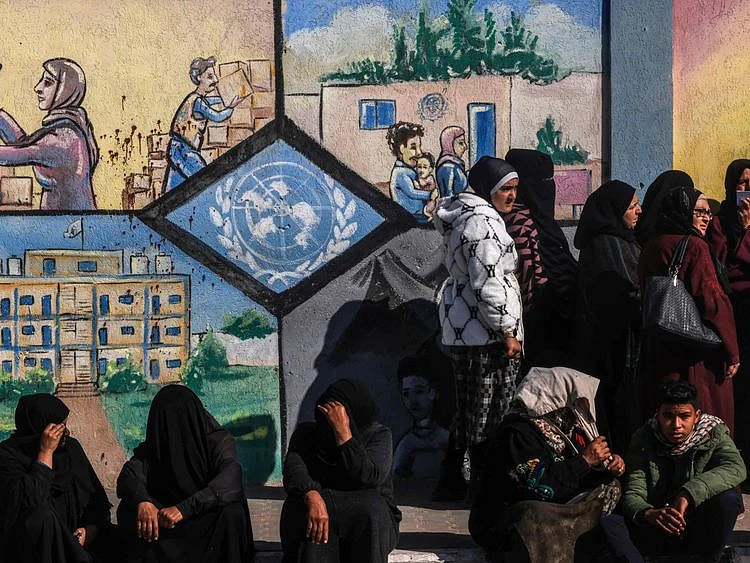What is UNRWA, the main aid provider in Gaza that is accused of militant links?
Agency has 13,000 employees in Gaza alone, vast majority of them Palestinians

Gaza: Israel’s allegations that 12 employees of a United Nations agency were involved in Hamas’ October 7 attack have led several Western countries to cut off funding and reignited debate over Gaza’s biggest humanitarian aid provider.
The UN agency for Palestinian refugees, known as UNRWA, employs thousands of staffers and provides vital aid and services to millions of people across the Middle East. In Gaza, it has been the main supplier of food, water and shelter to civilians during the Israel-Hamas war.
The Israeli government has accused Hamas and other militant groups of siphoning off aid and using UN facilities for military purposes.
UNRWA denies those allegations and says it took swift action against the employees accused of taking part in the attack. The United States and nine other Western nations that together provided more than half of UNRWA’s budget in 2022 nevertheless suspended their funding to the agency.
Also Read
UN chief calls for donors to maintain Gaza aidCountries halt funding to UN agency in GazaUS, Israel, Egypt, Qatar officials in Paris working towards Gaza ceasefire: sourcesUAE welcomes decisions of International Court of Justice to take provisional measures to protect Palestinians in Gaza StripUN Secretary-General Antonio Guterres says 2 million Palestinians in Gaza, or 87 per cent of the population, rely on UNRWA services that would be scaled back as soon as February if the money is not restored.
WHAT IS UNRWA AND WHY WAS IT CREATED?
The UN Relief and Works Agency for Palestinian Refugees in the Near East was established to provide aid to the estimated 700,000 Palestinians who fled or were driven out of what is now Israel during the 1948 war surrounding the country’s creation.
The Palestinians say the refugees and their descendants, who now number nearly 6 million across the Middle East, have the right to return to their homes.
Israel has refused, because if the right of return were to be fully implemented it would result in a Palestinian majority inside its borders. The fate of the refugees and their descendants was among the thorniest issues in the peace process, which ground to a halt in 2009.
UNRWA operates schools, health clinics, infrastructure projects and aid programmes in refugee camps that now resemble dense urban neighbourhoods in Gaza, the Israeli-occupied West Bank, Lebanon, Syria and Jordan. It has 13,000 employees in Gaza alone, the vast majority of them Palestinians.
In Gaza, where some 85% of territory’s 2.3 million people have fled their homes, over 1 million are sheltering in UNRWA schools and other facilities.
WHAT DO ISRAEL AND OTHER CRITICS SAY ABOUT UNRWA?
Israel accuses UNRWA of turning a blind eye as Hamas, which has ruled Gaza since 2007, siphons off aid intended for civilians and fights from in and around UN facilities, several of which have been struck during the war. It also has exposed Hamas tunnels running next to or under UNRWA facilities and accuses the agency of teaching hatred of Israel in its schools.
UNRWA denies those allegations. It says it has no links to Hamas or to any other militant groups, and that it thoroughly investigates any allegations of wrongdoing and holds staff accountable. It says it shares lists of all of its staff with Israel and other host countries.
The 12 employees are said to have participated in the surprise October 7 attack in which Hamas fighters from Gaza overran Israel’s extensive border defences. Other militants joined in the subsequent rampage through nearby communities, which left 1,200 people dead, mostly civilians. Around 250 others, including children, were captured and dragged into Gaza.
UN chief Guterres said nine of the accused UNRWA employees were immediately terminated, one was confirmed dead and the other two still need to be identified. He said all would be held accountable, including through criminal prosecution.
Neither the details of the allegations nor the evidence supporting them has been made public.
WHAT DO THE FUNDING CUTS MEAN FOR GAZA?
The United States, which was the first country to suspend funding, is the biggest donor to UNRWA, providing it with $340 million in 2022. The United Kingdom, Canada, Australia, Germany, Italy, the Netherlands, Switzerland, Finland and France have also suspended aid.
The 10 countries together provided nearly 60 per cent of UNRWA’s budget in 2022. It was not immediately clear when or how the suspension of aid would affect the agency’s day-to-day operations. Norway and Ireland said they would continue funding UNRWA, while other donors have not yet made a decision.
Sign up for the Daily Briefing
Get the latest news and updates straight to your inbox
Network Links
GN StoreDownload our app
© Al Nisr Publishing LLC 2026. All rights reserved.